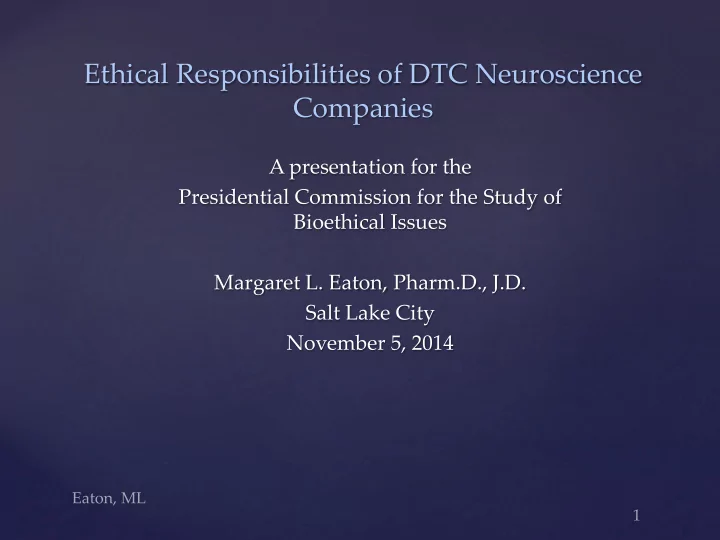

Ethical Responsibilities of DTC Neuroscience Companies A presentation for the Presidential Commission for the Study of Bioethical Issues Margaret L. Eaton, Pharm.D., J.D. Salt Lake City November 5, 2014
Derivation of the Ethical Responsibilities Technologies that enable the monitoring and/or modulation of the function of the brain challenge existing notions of free will, identity, privacy, and mental health and well-being and pose additional social and ethical concerns when commercialized as products for both medical and nonmedical applications
Corporate Operating Principles MAXIMIZATION OF SHARHOLDER VALUE VS CORPORATE SOCIAL RESPONSIBILITY Question: When the brain information/impact has human medical significance, to what extent should companies heed/adopt/consider the ethical norms of the medical profession? Patient centric Non-malfeasance Beneficence Respect for autonomy Provide full information Refrain from coercion & exploitation Confidentiality
Prioritized Goals of the Activity Traditional Business priorities Self then social freedom to operate, pursue profits, open competition, pragmatism, and efficiency thereby serving financial interest of shareholders ultimately benefit society by producing useful products Traditional Medicine priorities Social then self help the sick, advance medical knowledge freedom to practice financial gain
Initial & Sustained Validity Consumers claim and have legal rights to reasonably efficacious and safe products Duty of the company to introduce to the market only those products and services that have been validated and for which the safety and efficacy have been corroborated by scientific and medical consensus avoid premature marketing identify how product upgrades or changes in medical knowledge affect prior assessments and claims notify prior consumers of these changes
Privacy Donald Kennedy: “I already don’t want my employer or my insurance company to know my genome. As to my “brainome”, I don’t want anyone to know it for any purpose whatsoever. It is . . . my most intimate identity.” Duty of companies to inform consumer and protect privacy Explicit and easily accessible statements about the data who owns it what does the company do with it who can gain access to it how is it protected can the consumer opt out of certain provisions of the policy and still purchase the product?
Therapeutic Gap Deficits are detected with no treatment options available consumers are at risk for developing depression, anxiety and social problems related to their assumption that mental deficits are inevitable with no ability to prevent, control, or reverse Duty of the company to ensure that knowledge about brain function is empowering not harmful
Corporate Self-interest Companies that sell an assessment tool and a post- assessment product or service the frequency of diagnosis directly promotes growth in the treatment or service arm of the business Companies whose product usefulness is enhanced by the size of its database When competition for data becomes the driving force for consumer recruitment, rather than product or service improvement, practices could become aggressive or coercive Duty of the company to recognize the incentive to over- promote and to curb self-serving practices
DTC Advertising- Critics Ads that contain unsubstantiated claims constitute an insult to consumer decision-making and autonomy The knowledge disparity between the company & the consumer is often exploited Ads “medicalize” normal conditions Appeals to enhance abilities raise distributive justice issues high costs limit access ads are targeted to wealthier consumers who can afford the product Appeals to fear in vulnerable populations Loss of mental control Your child will suffer If the target population is susceptible (elderly, adolescents, parents of ADHD children, cognitively impaired, depressed people, those with low health literacy, etc) ads can exceed the legitimate goal of manipulating consumer behavior There can be a fine line between persuasion and coercion
DTC Ads Neuropsychotropic Drugs DTCA techniques to promote a perceived need for the drug self diagnosis: mental illness self-assessment tests emotional appeals: fear, expectations of happiness, regret for not using the product normalize the illness to overcome reluctance to seek treatment success stories no mention of research showing lack of SSRI efficacy over placebo coaching scripts on how to ask your doctor for the drug These ads are ubiquitous, are effective in increasing prescribing, & contribute to over-prescribing
Dietary Supplements for Alzheimer’s Disease While neuroscientists debate the most basic of biological mechanisms that may be involved in mental function and illness, ads for supplements confer scientific credibility to claims by referring to, e.g.,: “enhances neurotransmitter precursors”, “boosts mitochondrial activity”, protects against “free-radical attack.” Dietary supplements are not required to demonstrate safety and efficacy through clinical trials before distribution Yet, claims such as this are made: “designed to enhance the health of your brain for improved brain function, increased focus, and better memory. With each serving, you’ll be able to reduce stress and increase the flow of blood to your brain for more clarity”
EEG Headband Ad A “brain fitness tool that helps you do more with your mind, and more with your life, in just 3 minutes a day” to “improve your focus, attention and composure” No peer reviewed controlled studies have demonstrated safety or efficacy of the device or the associated apps CEO: “This is the first EEG device that's really a consumer product, that's designed for ease of use, and comes with an app that's really meaningful.”
Recommendations Companies that sell ethically and socially sensitive products seek the advice of ethicists familiar with the biopharmaceutical industry train personnel to avoid ethical pitfalls e.g.,, the Bad Ad Program of Office of Prescription Drug Promotion Industry groups for these companies adopt guidelines to address the ethical aspects of their activities validity and reliability, safety, privacy protections, evidence based claims, responsible advertising If the product has medical implications consider adopting decision making frameworks and ethical norms of medicine to to ensure beneficent and non-harmful use consider voluntarily following regulations and guidelines that would apply if the company was subject to regulation
Recommend
More recommend